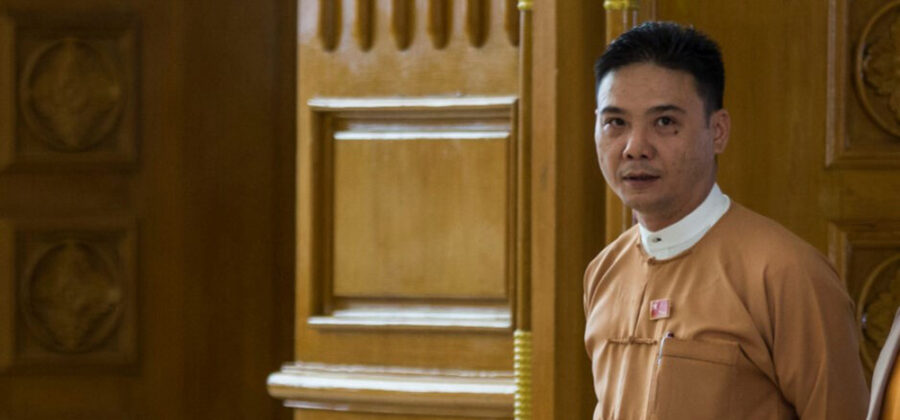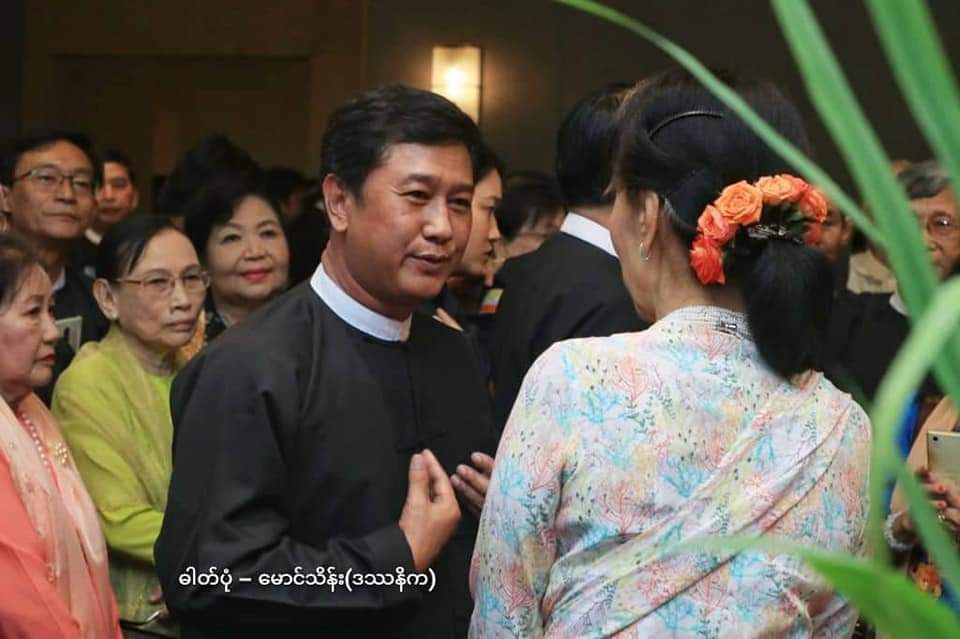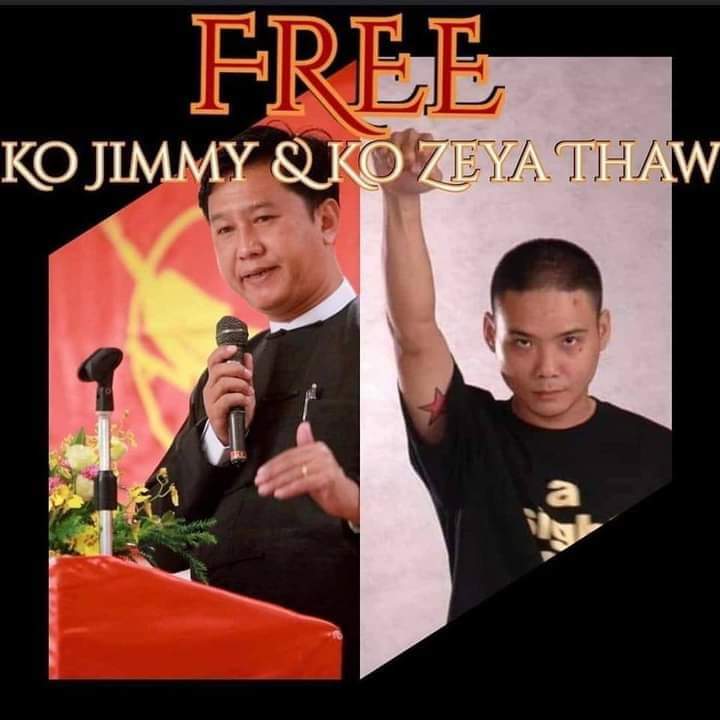Is Myanmar’s junta really so merciless that it would execute leading pro-democracy activists Ko Jimmy and Ko Phyo Zeya Thaw, as it has decreed? And what will happen if it does?
For many people—be they members of pro-democracy groups, the countless young resistance fighters across the country, or the general public, who already hate the ruling generals for the atrocities they have committed, and for their sheer barbarity—the execution of the two public figures would feel as if their hearts were being ripped out of their chests.
That pain would be unforgivable.
Ko Jimmy, a leading activist since the 1988 popular uprising, and Ko Phyo Zeya Thaw, a hip-hop pioneer turned MP of the National League for Democracy, are dear to many people and are regarded by the public as symbols of the ongoing anti-regime resistance.
Hanging them would certainly escalate the ongoing popular resistance against the junta and bring about all-out war.

- Hip-hop pioneer-turned-NLD MP Phyo Zeya Thaw is seen in the Union Parliament in Naypyitaw. / The Irrawaddy
However, we need to discuss first whether the junta is really serious about executing these two leading activists and two other anti-coup protesters.
Some people are convinced the junta is bluffing, and simply wants to give anti-regime forces a scare. Some others, including veteran pro-democracy activists and politicians, don’t believe the junta would go through with executing political prisoners—a step not taken by previous military regimes over the past four decades. Some reject the possibility because such a move would yield no political benefit for the ruling junta. Some speculate that the junta is using the execution order to gain leverage with the international community, which doesn’t recognize it as a legitimate government and has targeted it with sanctions and other punitive measures.
It seems to me, however, that the junta is serious about executing the two. I say this with a truly heavy heart—I know both Ko Jimmy and Ko Zeya Thaw, and they know me well, too.
By the time junta spokesman Major General Zaw Min Tun disclosed last Friday that the junta had approved their death sentences, all of the two condemned men’s appeals against their death sentences had already been rejected. They would be hanged soon according to prison procedures, the spokesperson added.
In their appeal processes, Min Aung Hlaing, as chief of the junta, was their last recourse. It was he who rejected their final appeals; he was the one who gave the final order to carry out the executions.
As far as I know, no political prisoners who received death sentences under the previous regime after the nationwide anti-regime uprising in 1988 were required to go all the way through that appeal process. That offers a clear indication that the regime never really intended to execute them, despite handing down death sentences to political prisoners, some of whom had even taken up arms against the junta and sought to assassinate the top ruling generals. Though the regime incarcerated thousands of political prisoners, not one was hanged in 1988 or in the following decades.
The current regime includes many of the same characters as its predecessor, but the junta led by coup maker Min Aung Hlaing is even more ruthless and even less rational. Min Aung Hlaing himself seems more motivated by personal feelings and more vengeful.
We are reminded daily that his regime is willing to go to new extremes, engaging in atrocities including killings, torturing activists and politicians to death within hours of their arrest, kidnapping as hostages the family members of wanted anti-regime protesters, scorching towns and villages whose residents oppose the junta, and so on.

- Veteran democracy activist Ko Jimmy, who is also a leading member of the 88 Generation Students Group, is seen with State Counselor Daw Aung San Suu Kyi at a dinner hosted by her on July 17, 2019.
In short, his regime has been waging war against its own civilian population since the coup.
In response, the regime has faced unprecedented resistance from the public and anti-regime forces across the country. More than a year-and-a-half since the February 2021 coup his regime still has not been able to bring the country under its control. No country has officially recognized the regime as a legitimate government. Meanwhile, the parallel National Unity Government formed by elected lawmakers and their allies has gained international support, either directly or indirectly.
And the coup Min Aung Hlaing wrongly thought would go smoothly has agitated the population to revolt. In response to the regime’s brutal suppression, what began as peaceful anti-coup protests have transformed into a radical revolution across the country. His coup has prompted tens of thousands of young people to form their own armies, collectively known as the People’s Defense Force (PDF), to fight his troops.
The attempted takeover has devolved into an embarrassing debacle for military chief Min Aung Hlaing; given what we know of his personality, this would seem sufficient motivation for him to order the executions of Ko Jimmy and Ko Phyo Zeya Thaw.
No doubt, the two men have been personally selected by Min Aung Hlaing and his regime from among the dozens of prisoners who have been sentenced to death; in what is clearly a calculated choice, they have been chosen as the first to die.
It’s an act of reprisal—a reprisal against all the pro-democracy groups, resistance forces and ethnic armed groups that have supported the newly formed PDFs, and against much of the international community, which has refused to recognize his regime as a legitimate government.
Min Aung Hlaing’s cruel act of reprisal likely has the following goals:
- To put fear into the anti-regime forces that are fighting the junta’s troops in many areas and assassinating the junta’s associates in urban areas; and to terrify the general public.
- To demoralize the community of pro-democracy activists, many of whom personally know or otherwise have great respect for Jimmy and Zeya Thaw, as well as all politicians and political groups that are against his regime including the National Unity Government (NUG), its allies and supporters.
- To send a warning to the international community, particularly countries like the United States and some others that have been supporting anti-regime groups including the NUG.
He will fail in these goals. As an irrational general with an evil mind, however, he is incapable of grasping what sort of reactions his regime will actually face if it carries out these executions.
The response would be all-out war from all of his opponents, as well as the general public. The current resistance being waged by PDFs and some EAOs across the country and the guerilla-style attacks in urban areas will dramatically escalate.
Myanmar Defense Force (Sagaing), a resistance group that is fighting the junta’s troops, has already announced that if the two prominent activists are executed, it will retaliate on the basis of an eye for an eye and a tooth for a tooth. Its leader said: “People like Ko Jimmy and Ko Zeya Thaw are big heroes of our revolution.”
The reaction will be massive and widespread, with similar responses being seen across the country as soon as the executions are carried out.
Min Aung Hlaing and his regime have already committed many unforgivable mistakes against the whole of Myanmar’s society, from the coup itself to the arrests of elected leaders to mass killings of citizens and more. The execution would be another unforgivable mistake.
Anyway, that’s what we can say about the junta and its evil motivations.
As for us, we have to play our part—to try to stop evil from prevailing and claiming the lives of these activists.

- A social media campaign poster calling for execution orders against Ko Jimmy (left) and Ko Phyo Zeya Thaw (right) to be reversed and for the pair to be freed
For the time being, the Myanmar people, the entire population, feel quite helpless under the boot of the regime. However, the international community could still help to stop this from happening. So far, a number of countries and world organizations have condemned the junta for its execution order.
The world’s superpower and democracy champion, the United States, is one of them. Ned Price, US Department of State spokesperson, said, “The United States strongly condemns the Burmese military regime’s reported plans to execute pro-democracy and opposition leaders, exemplifying the regime’s disregard for human rights and the rule of law. We urge the release of all unjustly detained.”
However, I really doubt these two sentences from the US will be able to save Ko Jimmy and Ko Phyo Zeya Thaw.
I am afraid that such global condemnation alone is unlikely to force or influence Min Aung Hlaing and his regime to rethink or reverse their execution order—and I wonder whether the world’s powerful democracies have any other options apart from issuing condemnations.
If they don’t, there are countries like China and the members of the Association of Southeast Asian Nations (ASEAN), as well as envoys and analysts who are willing, or actively lobbying, to engage with the regime. Don’t they also seek to convince Min Aung Hlaing not to kill the duo, if only to prevent Myanmar from descending into all-out war?
Please note that sparing Ko Jimmy and Ko Phyo Zeya Thaw the noose would save not just two lives, but many, by avoiding the serious bloodbath that would surely follow their executions.
For me, even as I struggle to end this story and convey to you all how serious the junta’s execution order is, I am praying that one day I will be able to meet Ko Jimmy and Ko Phyo Zeya Thaw on the streets of Yangon once again.
Naing Khit is a commentator on political affairs.
You may also like these stories:
Junta Chief to Preside Over Myanmar’s First Grand Military Review in Seven Years
Resistance Fighters and KIA Clash With Junta Forces in Northern Myanmar
Myanmar Junta Raises SIM and Internet Taxes to Silence Opposition
















